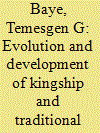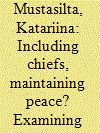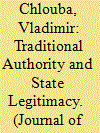|
|
|
Sort Order |
|
|
|
Items / Page
|
|
|
|
|
|
|
| Srl | Item |
| 1 |
ID:
117741


|
|
|
|
|
| Publication |
2012.
|
| Summary/Abstract |
There has been increasing consciousness among the government institutions of Bangladesh about social protections as measures to protect people from becoming trapped into poverty. The country has therefore, been conducting series of Social Safety Net Programmes (SSNPs) to implement social protections for addressing the needs of the poor and the vulnerable people. These SSNPs range from relief supports for the victims of natural disasters to health and sanitation services, microfinance for rural women, and legal services for establishing citizens' rights. However, with the absence of multilevel governance in the social, political, and economic sectors of Bangladesh, the extensity of social disparity and inequality remained persistently the same. This is an important issue for a country like Bangladesh where social disparity exists both in agency and structure in which both formal and informal political, economic, social, and cultural institutions are restricting people's participation on the basis of wealth, power, and identity. Therefore, while the social protection policies and programmes have greater resonances in Bangladesh, the poorest and the vulnerable communities have not been benefited that much yet. The paper attempts to explore the emerging need for multilevel governance for the social safety net measures in Bangladesh ranging from policy formulations to implementations in effective ways. The paper addresses governance deficits and delineates the need for multilevel governance in Bangladesh. It is argued that administering SSNPs through traditional governance approaches suffer from inefficiency and specificity, thus generate a good deal of debate regarding the sustainability and impacts of SSNPs in Bangladesh. And for some functions associated with the proper delivery of social safety net programmes in Bangladesh, multilevel governance set up is more well suited.
|
|
|
|
|
|
|
|
|
|
|
|
|
|
|
|
| 2 |
ID:
112385


|
|
|
|
|
| Publication |
2012.
|
| Summary/Abstract |
Many kingdoms and states were created and consolidated in Ethiopia and the Horn by conquest, but many others developed through more peaceful borrowing and assimilation of ideas and institutions from neighbors, and even through internal developments, stimulated by population growth, improved production, the need to organize and mobilize for migration, or protection against new external threats.
|
|
|
|
|
|
|
|
|
|
|
|
|
|
|
|
| 3 |
ID:
165449


|
|
|
|
|
| Summary/Abstract |
The continued influence of traditional governance in sub-Saharan Africa has sparked increasing attention among scholars exploring the role of non-state and quasi-state forms of governance in the modern state. However, little attention has been given to cross-country and over-time variation in the interaction between state and traditional governance structures, particularly in regard to its implications for intrastate peace. This study examines the conditions under which traditional governance contributes to state capacity to maintain peace. The article argues that the type of institutional interaction between the state and traditional authority structures influences a country’s overall governance dynamics and its capacity to maintain peace. By combining new data on state–traditional authorities’ interaction in sub-Saharan Africa from 1989 to 2012 with intrastate armed conflict data, I conduct a systematic comparative analysis of whether concordant state–traditional authorities’ interaction strengthens peace. The empirical results support the argument that integrating traditional authorities into the public administration lowers the risk of armed conflict in comparison to when they remain unrecognized by the state. Moreover, the analysis suggests that the added value of this type of interaction is conditional on the colonial history of a country.
|
|
|
|
|
|
|
|
|
|
|
|
|
|
|
|
| 4 |
ID:
174418


|
|
|
|
|
| Summary/Abstract |
Do African traditional leaders weaken state legitimacy at the local level? Past scholarship raises the possibility that unelected chiefs might undermine trust in national-level institutions. Relying on an original map of areas governed by chiefs and survey data from Namibia, this study examines whether respondents governed by traditional leaders are less likely to trust state institutions. The main finding is that compared to individuals not living under traditional authority, chiefdom residents are more likely to trust government institutions. Partially to alleviate the concern that chiefdom residence is endogenous to trust in national-level institutions, this article uses a genetic matching strategy to compare relatively similar individuals. A further finding is that the association between chiefdom residence and trust in state institutions is considerably weaker and less statistically significant for individuals who do not share ethnicity with their chief. This evidence suggests that traditional leaders’ ability to complement state institutions at the local level is compromised by ethnic diversity.
|
|
|
|
|
|
|
|
|
|
|
|
|
|
|
|
|
|
|
|
|